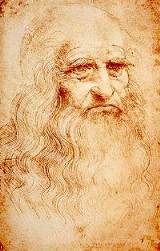
polymath
: painter
, sculptor, architect
, musician
, scientist
, mathematician
, engineer
, inventor, anatomist, geologist
, cartographer, botanist and writer
whose genius
, perhaps more than that of any other figure, epitomized the Renaissance humanist ideal.
Leonardo has often been described as the archetype of the Renaissance Man
, a man of "unquenchable curiosity" and "feverishly inventive imagination".
As a well-spent day brings happy sleep, so life well used brings happy death.
![]()
Life well spent is long.
![]()
Shun those studies in which the work that results dies with the worker.
![]()
Whoever in discussion adduces authority uses not intellect but rather memory.
![]()
Iron rusts from disuse; stagnant water loses its purity and in cold weather becomes frozen; even so does inaction sap the vigor of the mind.
![]()
It is easier to resist at the beginning than at the end.
![]()
Necessity is the mistress and guardian of Nature.
![]()
Human subtlety...will never devise an invention more beautiful, more simple or more direct than does nature, because in her inventions nothing is lacking, and nothing is superfluous.
![]()
Mechanics is the paradise of the mathematical sciences because by means of it one comes to the fruits of mathematics.
![]()
I am not to blame for putting forward, in the course of my work on science, any general rule derived from a previous conclusion.
![]()

